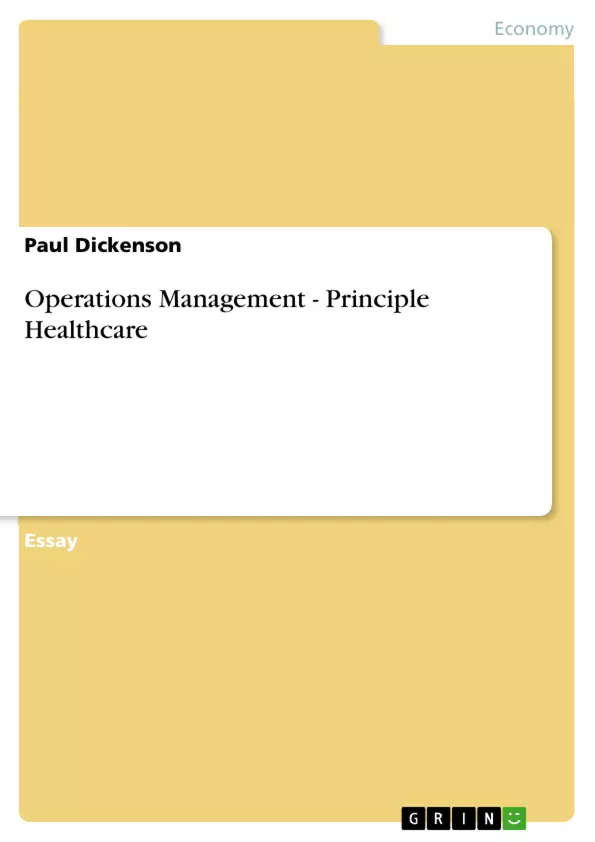Principle Healthcare (PHC) is based in Skipton, North Yorkshire and was founded 6 years ago by a team of healthcare industry professionals. They specialise in the manufacture of multi-vitamins and supplements for all ages. Their vision is to create, “A healthcare business which could make a real difference.” By closely following this PHC are able to cater to all different age groups and ailments. The vision is reflected in the company’s name, Principle; it was chosen as the perfect name to describe the nature of the business (Principle Healthcare website, 2008). Main competitors to PHC are Brunel Healthcare, who offers a range of products almost identical to PHC. They supply to supermarkets such as Tesco, Sainsbury’s, Somerfield, Co-operative and Superdrug.
Inhaltsverzeichnis (Table of Contents)
- EVALUATE PRINCIPLE HEALTHCARE'S OPERATIONAL STRATEGY
- THE INPUT-TRANSFORMATION - OUTPUT (ITO) DIAGRAM (FIG. 1)
- CUSTOMERS
- 1PROCESS INPUTS
- MATERIALS
- INFORMATION
- STAFF
- FACILITIES
- TRANSFORMATION
- 2RESOURCES USED
- PROCESS OUTPUTS
- THE 5 PERFORMANCE DIMENSIONS
- COST
- DEPENDABILITY
- FLEXIBILITY
- QUALITY
- SPEED
Zielsetzung und Themenschwerpunkte (Objectives and Key Themes)
This text aims to analyze and evaluate the operational strategy of Principle Healthcare (PHC), a company specializing in the manufacture of multi-vitamins and supplements. The text examines how PHC's operational strategy aligns with the core principles of operations management, using the Input-Transformation-Output (ITO) diagram as a framework for analysis.
- Operational strategy and its implementation in a healthcare manufacturing context.
- The role of customer segmentation and targeting in operational decision-making.
- The relationship between resource management and operational efficiency.
- The impact of cost, dependability, flexibility, quality, and speed on overall operational performance.
- The challenges and opportunities associated with managing operations in a competitive market.
Zusammenfassung der Kapitel (Chapter Summaries)
The text begins by outlining the background and vision of PHC, highlighting their focus on producing high-quality products at affordable prices. It then introduces the ITO diagram, a framework for understanding how inputs are transformed into outputs through a series of processes. The analysis delves into the specific inputs used by PHC, including materials, information, staff, and facilities. The transformation process is described in detail, highlighting the use of automated machinery and the importance of employee knowledge and skills. The outputs from PHC's operations are then examined, focusing on the 63 different brands of dietary supplements they produce.
The text then examines the five performance dimensions of operations: cost, dependability, flexibility, quality, and speed. Each dimension is analyzed in relation to PHC's specific operating environment, exploring both the strengths and weaknesses of their approach. For instance, the text notes that PHC operates on a high-volume, low-cost basis, which presents both opportunities and challenges for maintaining competitiveness. The text also discusses the importance of dependability, highlighting PHC's reliance on timely supplier deliveries and their commitment to meeting customer deadlines.
The analysis concludes with a discussion of flexibility, quality, and speed, considering how these dimensions influence PHC's overall operational effectiveness. The text emphasizes the importance of maintaining high-quality standards in a market where consumer trust is paramount. It also notes the challenges associated with achieving speed and flexibility in a production environment characterized by complex processes and multiple product variants.
Schlüsselwörter (Keywords)
This text focuses on operational strategy, manufacturing, healthcare, multi-vitamins, supplements, input-transformation-output (ITO) diagram, resources, process inputs, transformation process, process outputs, performance dimensions, cost, dependability, flexibility, quality, speed, customer segmentation, competitive market, and operational efficiency.
Frequently Asked Questions
What does Principle Healthcare specialize in?
They specialize in the manufacture of multi-vitamins and dietary supplements for various age groups and ailments.
What is the Input-Transformation-Output (ITO) diagram?
It is a framework used in operations management to describe how resources (inputs) are converted (transformed) into finished products (outputs).
What are the 5 performance dimensions analyzed?
The dimensions are Cost, Dependability, Flexibility, Quality, and Speed.
Who are the main competitors of Principle Healthcare?
A major competitor is Brunel Healthcare, which supplies similar products to large supermarkets like Tesco and Sainsbury’s.
How does PHC maintain competitive costs?
PHC operates on a high-volume, low-cost basis, utilizing automated machinery and efficient resource management.
- Quote paper
- Paul Dickenson (Author), 2008, Operations Management - Principle Healthcare, Munich, GRIN Verlag, https://www.grin.com/document/142350



